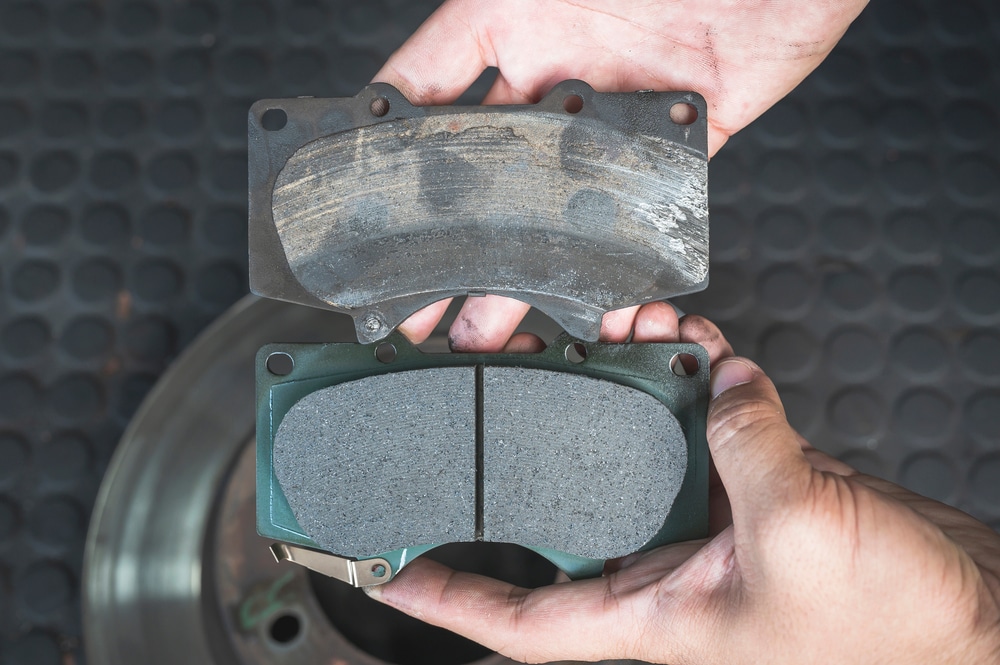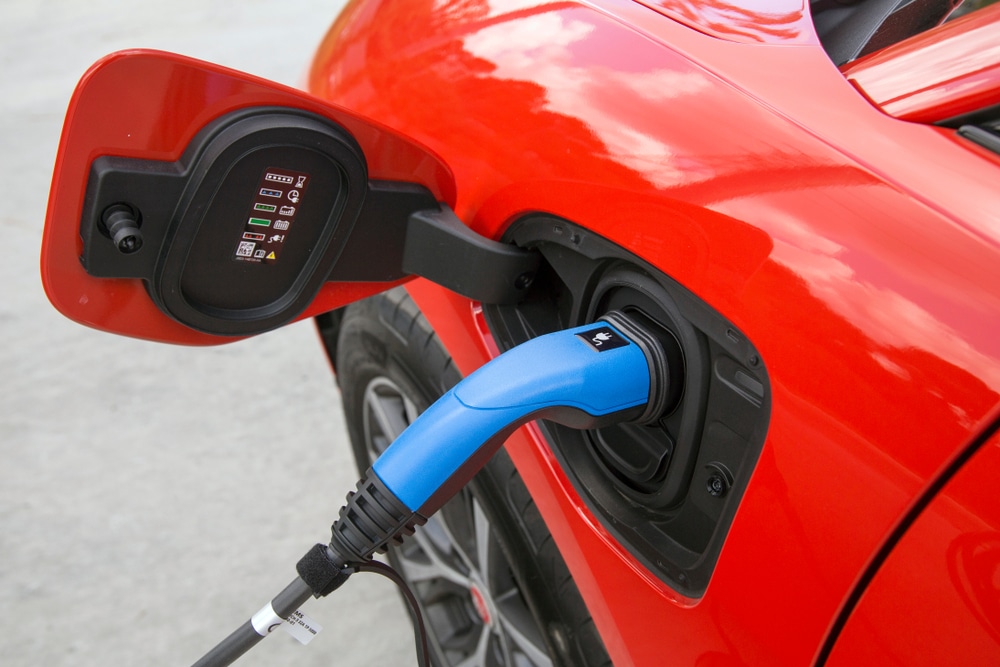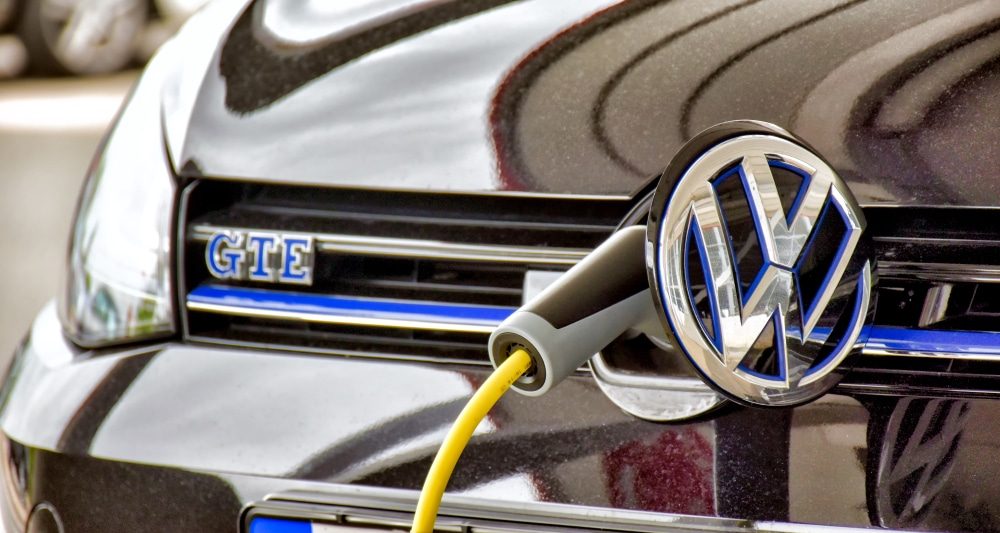Brake Pads
Brake pads are one of the most frequently replaced parts on any vehicle. But while they’re a routine part of servicing, many drivers don’t give them much thought—until something changes. A warning light. A screeching sound. A shift in how your car feels when braking.
This guide gives you the tools to know what to do when something doesn’t feel right.
At Smith’s of London in Croydon, we’ve handled thousands of brake inspections and replacements. We’ve seen the damage that can be caused by delayed action, and want to help our customers spot issues early to avoid this. In this blog, we’ll walk you through how brake pads work, what causes them to wear faster, and the signs to watch for before bigger problems develop.
Whether you’re in Croydon, Beckenham, Coulsdon or nearby, this guide will help you make confident, informed decisions about your brake pads.
Let’s begin with the basics—what exactly do they do?
How Your Brake Pads Function Under Pressure
Brake pads are at the heart of your car’s ability to stop safely. Housed within the brake calliper, they’re designed to press against the brake discs whenever you apply the pedal. (Some vehicles use a drum-and-shoe setup instead, but the overall principle is the same.)
Here’s what happens in that moment: when you press the brake pedal, hydraulic pressure forces the pads onto the rotating brake disc. That creates friction, which slows the wheel and brings the vehicle to a stop. The process also generates intense heat, something the brake pads must withstand repeatedly, without losing performance.
Over time, a small layer of the pad wears away each time you brake. That’s entirely normal and expected. But once the material becomes too thin, the pad loses its effectiveness, and if it’s left too long, it can begin damaging the discs themselves.
At Smith’s of London in Croydon, we check your brake pads during every service. If they’re worn or nearing the limit, we’ll give you clear advice so you can replace them before performance, cost, or safety becomes a concern.
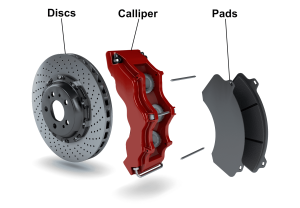
Understanding the Main Types of Brake Pads Available
All brake pads are designed to stop your car, but the materials they’re made from can vary, and that makes a difference to how they perform. Choosing the right type isn’t just about cost or availability, it’s about safety, lifespan and how well the entire braking system works together.
At Smith’s of London in Croydon, we only ever fit brake pads that meet your vehicle’s original manufacturer specifications. That ensures proper compatibility and consistent braking performance in all conditions.
Here are the three main types of brake pads we work with:
- Organic (NAO) pads
These are made from fibres like cellulose and aramid, held together with resin. They’re typically quieter and softer on discs, making them a good choice for everyday use, but they wear faster and don’t handle heat as well as other options.
- Semi-metallic pads
Containing metal fibres such as steel or copper, these pads offer better heat resistance and braking performance, especially under pressure. However, they can produce more noise and wear your discs faster.
- Ceramic pads
These combine ceramic compounds with fine copper fibres. They produce very little dust, handle heat extremely well, and are commonly used in high-performance or premium vehicles. They tend to cost more, but last longer and perform consistently.
The thing is, when it comes to brake pads, there’s no one-size-fits-all. The pad needs to match the vehicle’s braking system, including the discs and callipers, for everything to work as intended. That’s why every brake pad replacement at Smith’s of London is based on the correct specification. Your safety depends on it.
What Speeds Up Brake Pad Wear
Brake pads are designed to wear over time, but some wear out far quicker than others. At Smith’s of London, we often find that the reason isn’t faulty parts, but hidden issues elsewhere in the braking system or the way the vehicle is used.
Here are the main factors that speed up brake pad wear:
- Stop-start driving and short journeys
If you’re frequently braking in town traffic or on short trips, your pads won’t get a break—literally. That constant friction builds heat and wears the material down faster than on long, open-road journeys.
- Calliper faults
A sticking calliper can cause the brake pads to remain in light contact with the disc even after you’ve stopped braking. This continuous rubbing leads to uneven, premature wear.
- Disc surface condition
Brake pads work best against a clean, smooth disc. If the disc is warped, heavily scored, or showing signs of corrosion, it can chew through a set of pads in no time, and compromise your braking ability.
- Incorrect pad type
Fitting the wrong pad, one that doesn’t match the manufacturer’s specifications, can result in faster wear, poor performance and higher dust levels. That’s why we always fit the right pad for the vehicle.
- Contamination and debris
Moisture, grit, and road salt can work their way into the braking system, especially during winter. If these build up between the pad and calliper, they can cause uneven wear or even lead to the pad material breaking away from the backing plate.
At Smith’s of London in Croydon, we don’t just replace brake pads. We look at the full braking system, so we can catch these underlying issues early and help you avoid repeat replacements or more serious repairs.
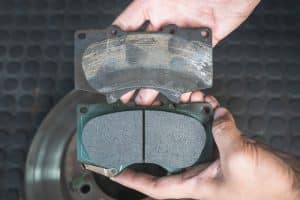
How to Spot the Signs of Brake Pad Trouble
Brake pads don’t usually fail without warning. If they’re starting to wear down, your vehicle will often give you clear signals; it’s just a matter of knowing what to look and listen for.
Here are the most common signs that your brake pads may need replacing:
Screeching or squealing when braking
Many brake pads include a built-in wear indicator (a metal tab that makes a high-pitched sound when the material gets low). If you hear this regularly, it’s doing exactly what it’s designed to: warn you that the pads need attention.
Grinding sounds
A grinding noise is often a sign that the pad material has worn down completely, and the metal backing is now rubbing directly against the brake disc. At this stage, braking performance is severely reduced, and disc damage is almost guaranteed.
Brake warning light
Some cars are equipped with electronic sensors that trigger a dashboard warning when the pads are nearing the end of their life. It’s not just a suggestion, it’s a signal to get your brakes checked without delay.
Even if the car still feels like it’s braking normally, these symptoms shouldn’t be ignored. At Smith’s of London in Croydon, we’ll inspect the entire braking system and let you know exactly what’s going on with clear, helpful advice.
What Can Go Wrong If You Delay Brake Pad Replacement
It’s easy to postpone a brake pad replacement, especially if the car still feels fine. But worn pads don’t fix themselves. And the longer they’re left, the more likely they are to cause damage that’s far more serious (and expensive) than the original job.
Brake pads are designed to wear gradually. But once the friction material is gone, the metal backing starts to press against the brake discs. That metal-on-metal contact damages the discs quickly, and can also put strain on the callipers and brake fluid, especially if the heat builds up.
At that point, you’re not just replacing pads. You could be facing the cost of new discs, potential calliper repairs, or degraded fluid that affects your braking consistency. In some cases, uneven braking across the wheels can affect control, especially in emergency situations.
At Smith’s of London in Croydon, we’ve seen first-hand how quickly a straightforward job becomes a costly repair. If you’ve noticed any symptoms, or it’s been a while since your last check, don’t wait. A quick inspection now could save you hundreds, and keep your car safe when it counts.
Why Choose Smith’s of London for Brake Pad Replacement?
Brake pads play a crucial role in keeping your vehicle safe, but only when they’re in good condition and properly fitted. At Smith’s of London in Croydon, we take your safety seriously. Every brake pad replacement we carry out is done to the exact manufacturer specification, with a full system check included as standard.
When you book with us, you can expect:
- Genuine or OEM-approved brake pads that match your vehicle
- Full inspection of pads, discs and callipers, not just the worn part
- A 12-month parts and labour guarantee for complete peace of mind
- Straightforward advice from experienced technicians. No upselling, no guesswork
We proudly serve drivers across Croydon, Beckenham, Coulsdon and beyond, delivering dependable, safety-focused servicing.
We have a {{average-rating}} star Google rating from {{review-count}} satisfied customers.
Call 020 8674 3377 today to book your brake check or replacement. At Smith’s of London, your safety is our priority every time.
